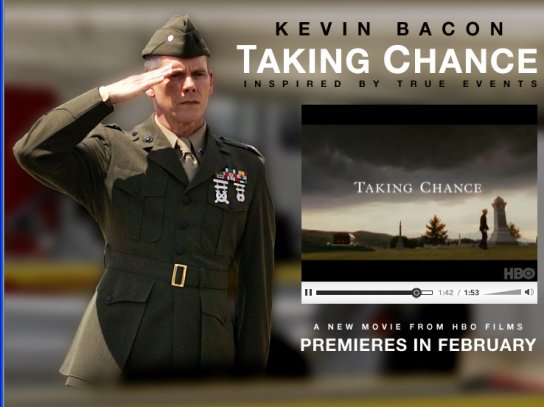
HBO film chronicles final journey for Marine
By Dan Lamothe - Staff writer
With the war in Iraq raging in 2004, Lt. Col. Mike Strobl found himself at Dover Air Force Base, Del., waiting to escort home the remains of a fallen Marine he had never met.
So began his relationship with Pfc. Chance Phelps, who was shot and killed in April 2004 while defending fellow Marines from a convoy attack in Anbar province, Iraq. Over the next few days, Strobl made the solemn trip from Dover to Phelps’ final resting place in Dubois, Wyo., shepherding the Marine’s body through stops in Philadelphia; Minneapolis; Billings, Mont.; and Clifton, Colo.
For Phelps, later promoted to lance corporal, the journey ended in a quiet Wyoming cemetery. For Strobl, though, the experience continues to play a major role in his life, as the retired officer prepares for the TV premiere Saturday of a film chronicling his trip.
“Taking Chance” is an HBO film based on the journal Strobl kept of his time with Phelps and the powerful yet subtle ways a nation reacted to one Marine’s death.
“Taking Chance” premieres Saturday at 8 p.m. EST on HBO.
Strobl first shared his journal with his wife and a few Marine friends after returning from Wyoming. But the memoir was passed around and eventually took on a life all its own.
“When my story started circulating via e-mail and I started getting a lot of responses ... I thought, ‘OK, I’ll get a few responses and then people will move on and forget about it,’” said Strobl, who helped write the screenplay. “But it just kept snowballing.”
Nearly five years later, it still is. With actor Kevin Bacon starring as Strobl, the film aired six times in eight days last month at the Sundance Film Festival, the largest independent film festival in the U.S. HBO is promoting the film heavily, and Strobl now counts the Phelps family and Bacon as family friends.
Unlike many other films and TV specials to develop from the Iraq war, Strobl’s story has neither political bent (think “Stop-Loss”) nor battlefield anger (HBO’s “Generation Kill,” among others). Instead, the film makes its mark with quiet, painstaking detail, playing with symbolism and the gestures of solidarity and gratitude Strobl witnessed along the way.
In one example, a flight attendant gives him a small gold crucifix, saying simply, “I want you to have this.” In another, Strobl has a conversation on a Minneapolis tarmac with a soldier also serving as a casualty escort. The sergeant is bringing his brother’s remains home, he divulges at the end of the conversation, trying to maintain composure.
The film also explores in detail the multilayered process of caring for the remains of a fallen service member. Phelps’ face is never shown, but viewers see everything from blood and mud being scrubbed from his fingernails to his watch, still set to Baghdad time, being steam-cleaned.
Bacon, who also played a Marine in “A Few Good Men” and “Frost/Nixon,” said there were advisers from both the Marine Corps Motion Picture and Television Liaison Office and Dover’s mortuary affairs team on hand during the 2007 filming.
“I got the impression that the Marine Corps felt like the movie was going to be handled respectfully and that it was time for this story to be told,” Bacon said.
Bacon himself delivers a powerhouse performance, playing the squared-away Strobl as alternately cheerful and deeply conflicted about his own choice to avoid a war tour and request a second stint crunching manpower numbers at Marine Corps Base Quantico, Va. In a particularly memorable scene, Strobl questions his decision in a conversation with a Korean War Marine veteran who greets him after he arrives in Wyoming.
“The guys I was in Desert Storm with went [in support of Operation Iraqi Freedom], and I stayed home,” Strobl says to veteran Charlie Fitz. “Those guys, guys like Chance ... they’re Marines.”
“And you think you’re not?” Fitz fires back. “You brought Chance home. You’re his witness now. Without a witness, they just disappear.”
Asked about the scene, Strobl said he didn’t volunteer to bring Phelps home to “treat his guilty conscience.”
“I think there’s always conflict for the Marines who are doing the jobs back stateside that have to be done, when so many of their buddies are over fighting,” Strobl said. “What was unique about my case is by the time I did the escort mission with Chance, I had volunteered to do another tour here at Quantico, so I did feel like maybe I wasn’t quite doing my share.”
In filming the movie, Bacon said he developed the sense there was “something bigger” about participating in the project. Much like Strobl’s journey from Dover to Wyoming, the production prompted an outpouring of emotion as it shifted from locations in New Jersey to Montana.
“I would go from scene to scene to scene, and ... as we would go through this, we would have new actors all the time and new extras, and sort of the only constant was me and this box,” Bacon said. “And even though there was nothing in our box, the people I would run into — the actors, the extras, crew people, the people who were watching us film — were incredibly moved by the whole thing.
“This one felt like we were dealing with an issue that was a little bit bigger and had a little bit more import — that it was an important story that needed to be told.”
